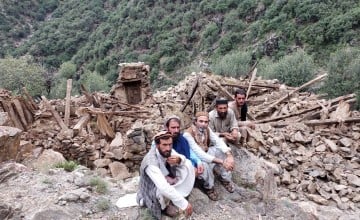
Read our 2024 annual report

Knowledge Hub
A powerful earthquake in Afghanistan has resulted in deaths, injuries and widespread devastation.
Just before midnight on Sunday night, a magnitude 6.0 earthquake struck eastern Afghanistan, with the provinces of Kunar, Nangarhar and Laghman, near the border with Pakistan, the worst hit. The mountainous landscape of Kunar meant that the quake triggered landslides and flooding.
As of September 5th, at least 2,200 people have been killed, with a further 3,000 people injured. However, the true scale of the disaster is still unfolding. According to the US Geological Survey, over 1.2 million people would have felt strong shaking, with five aftershocks occurring after the initial earthquake. The earthquake was shallow - that is, closer to the earth’s surface - so caused even more destruction.
Entire communities have been destroyed, with rubble blocking roads and landslides cutting off access to affected areas. Survivors of the disaster are struggling without food, water, shelter, and medical care. As many of the worse affected areas are remote, communications are limited, making rescue efforts difficult.

This is the latest tragedy to strike Afghanistan, a country that is prone to natural disasters, particularly earthquakes due to its number of fault lines and frequent movement among nearby tectonic plates. It was a serious 5.9 magnitude earthquake in 1998 that killed thousands of people that marked the beginning of Concern’s work in Afghanistan 27 years ago. In the last year alone, over 1,000 people are reported to have died in quakes in the region, while in October 2023, a 6.3 magnitude earthquake struck, causing thousands of fatalities.
Afghanistan's vulnerability to natural disasters is increasing the country’s instability and worsening the humanitarian crisis there. The global food crisis sparked by the conflict in Ukraine has hit hard an already-failing economy. Nearly 23 million Afghans are highly food insecure, including 8.7 million at risk of famine.
And the situation is exacerbated by the international isolation of Afghanistan since the takeover by the Islamic Emirate of Afghanistan (IEA, or the ‘Taliban’) in 2021; since then, Afghan woman and girls have experienced increased restrictions on their lives; and the return of over two million Afghan returnees.

Concern is coordinating with different actors and our Alliance2015 partner who are already on the ground to deliver life-saving assistance to families who need it most.
Thanks to the generosity of the public and support from the Irish Government, under Concern's Irish Aid Chronic Humanitarian Crisis (CHC) grant in Afghanistan, we have been able to transfer our pre-positioned stock of family-size tents and non-food item kits to ACTED, which will be distributed following a needs assessment. This assessment will also determine what supplies - including emergency shelter, blankets and cooking sets, critical medical supplies, drinking water and emergency food assistance - are needed and where.
You can help us continue to respond by donating to our Afghanistan Earthquake Appeal.




